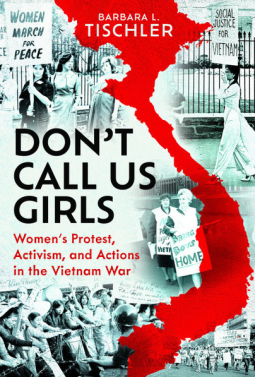
Don't Call Us Girls
Women’s Activism, Protest and Actions in the Vietnam War
by Barbara Leonora Tischler
This title was previously available on NetGalley and is now archived.
Send NetGalley books directly to your Kindle or Kindle app
1
To read on a Kindle or Kindle app, please add kindle@netgalley.com as an approved email address to receive files in your Amazon account. Click here for step-by-step instructions.
2
Also find your Kindle email address within your Amazon account, and enter it here.
Pub Date 30 Sep 2024 | Archive Date 25 Oct 2024
Pen & Sword | Pen & Sword History
Talking about this book? Use #DontCallUsGirls #NetGalley. More hashtag tips!
Description
Don’t Call Us Girls examines the importance of women’s participation in the Civil Rights Movement in the United States, and the international anti-war movement. This collective voice for peace, and an end to nuclear proliferation, reached back to before the Second World War and then firmly embedded itself during the war years when women assumed such important roles in the workplace that Franklin D. Roosevelt called them the ‘Arsenal of Democracy’.
When the men returned from war, women were encouraged by forces as powerful as government agencies and eminent psychiatrists to return to their ‘place’ at home. And return home they did, only to realize that they could use the skills they practiced as housewives to begin organizing themselves into groups that would start a wave of protest action that swept through the late 1950s, gathering up the Civil Rights Movement as it hurtled ever forward through the next two decades.
In the 1960s and 1970s, no institution or convention was sacred—many aspects of women’s lives were fair game for criticism, protest, and change. In this no-holds-barred era, women debated everything from international nuclear policies, pay equity and child care for women, to reproductive rights and sexual politics. They protested in the streets, outside the White House, in Trafalgar Square, at the Arc de Triomphe, on university campuses, and just about anywhere else they would be heard. They were tired of the role society had cast for them and they would not rest until they saw the substantial change that seemed promising with the emergence of Second Wave Feminism in the 1970s.
While we still live in a patriarchal society, we have these women to thank for many of the freedoms we now enjoy. If they have taught us anything, it is never to stop pushing back against the patriarchy and to rest only when we are truly equal. The final chapter of Don’t Call Us Girls reminds us that there is still a lot of work to do.
Available Editions
| EDITION | Hardcover |
| ISBN | 9781399066068 |
| PRICE | |



